

Why I'm hooked on grocery shopping with glass jars. Back in January, I wrote a post about the Johnson family, who have reduced household trash to one quart a year.
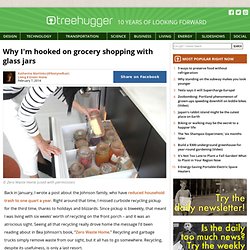
Right around that time, I missed curbside recycling pickup for the third time, thanks to holidays and blizzards. Since pickup is biweekly, that meant I was living with six weeks’ worth of recycling on the front porch – and it was an atrocious sight. Seeing all that recycling really drove home the message I’d been reading about in Bea Johnson’s book, “Zero Waste Home.” Recycling and garbage trucks simply remove waste from our sight, but it all has to go somewhere.
Recycling, despite its usefulness, is only a last resort. I’ve long considered myself to be someone who cares about the environment, and I try to reflect that in my daily actions – hanging laundry to dry, using cloth diapers, eating local food, keeping the thermostat low, conserving water, refusing Styrofoam and takeout cups, composting, buying thrift clothes. 10 steps for a 'zero waste' shopping routine. “Zero waste” is a lifestyle that embraces minimalism; rejects the ubiquitous disposable items that are everywhere in our society; challenges mainstream consumerism; and encourages people to come up with alternative reusable solutions to everyday life.

In the context of the articles I write, “waste” refers to municipal solid waste (MSW) – the kind of trash that gets hauled to landfills. This includes recycling, which you can read more about here. Food provides sustenance, but unfortunately it also generates trash, especially if the majority of food comes from a grocery store. While packaging is helpful and often necessary for keeping food fresh, uncontaminated, and easy to transport, anyone wanting to reduce their household trash knows what a nightmare it is to come home with thin plastic produce bags that get thrown out as soon as fruit meets the fruit bowl. 1. 2. 3. 4. 5. 6.
“Take your purchases without. 7. 8. 9. 10. Good luck! Trash is for Tossers: Vegetable Storage. I used to bring produce home from the market and throw it in my refrigerator unwashed.
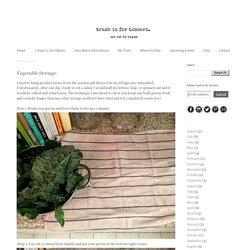
Unfortunately, after one day, ready to eat a salad, I would pull my lettuce, kale, or spinach out and it would be wilted and crunch-less. The technique I am about to show you keeps my leafy greens fresh and crunchy longer than any other storage method I have tried and it is completely waste free! Step 1: Wash your greens and leave them to dry in a colander Step 2: Lay out a cotton/linen napkin and put your greens in the bottom right corner. Zero Waste blogger Lauren Singer lets us look into her drawers and cabinets : Page 2. Trash is for Tossers: Zero Waste Shopping: The Essentials. Is it possible to shop without putting something in the cart that will not end up in the a landfill?
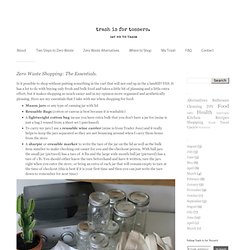
YES. It has a lot to do with buying only fresh and bulk food and takes a little bit of planning and a little extra effort, but it makes shopping so much easier and in my opinion more organized and aesthetically pleasing. Here are my essentials that I take with me when shopping for food.Mason jars or any type of canning jar with lidReusable Bags (cotton or canvas is best because it is washable) A lightweight cotton bag incase you have extra bulk that you don't have a jar for (mine is just a bag I reused from a sheet set I purchased)To carry my jars I use a reusable wine carrier (mine is from Trader Joes) and it really helps to keep the jars separated so they are not bouncing around when I carry them home from the storeA sharpie or erasable marker to write the tare of the jar on the lid as well as the bulk item number to make checking out easier for you and the checkout person.
Compost for all! Choices for the city or suburbs. In this edition of our continuing Town & Country series, Margaret and Katherine compare their experiences with composting.
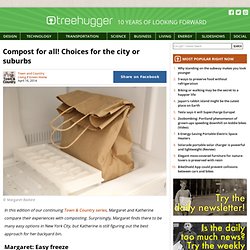
Surprisingly, Margaret finds there to be many easy options in New York City, but Katherine is still figuring out the best approach for her backyard bin. Margaret: Easy freeze I started researching composting options in the city for a story in grad school, but really my interest was pretty personal. Trash is for Tossers: Composting in a City. I have been composting for over one year now.
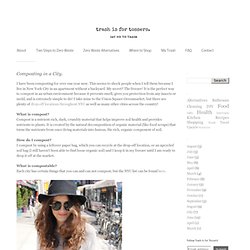
“Project Zero Waste” has officially begun! Step 1: I need to buy reusable cotton produce bags.
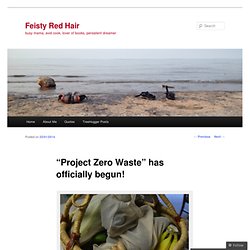
“Project Zero Waste” has commenced! Now, I realize we’re probably not going to be completely zero waste, and I likely won’t be able to achieve quite so complete a waste reduction as Bea Johnson’s family has, especially because I live in the middle of nowhere where they are very few options for alternative-style shopping, compared to San Francisco, but I’m going to work with what I’ve got. So far, I’ve had one failure and several small successes. The failure occurred at Bulk Barn, where I know customers aren’t supposed to bring their own containers, but I did it anyways.